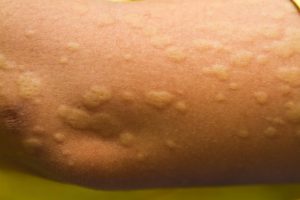Everyone is aware of seasonal allergies. They are very common beginning in the spring and lasting through fall – and many are affected by them. While these types of seasonal allergies are not prevalent in the winter months, there is another, much less common form of allergic reaction that affects some when the thermometer dips.
Cold urtcaria is an allergic reaction to cold temperatures. The skin of those with this condition will break-out into welts or hives when exposed to cold temperatures. No one knows exactly what causes cold urticaria. Certain people appear to have very sensitive skin cells, due to an inherited trait, a virus or an illness. In the most common forms of this condition, exposure to cold triggers the release of histamine and other chemicals into the bloodstream. Cold urtcaria is most common in young adults and it usually clears up within a couple of years.
Cold urticaria signs and symptoms include:
• Temporary reddish, itchy welts (hives) on the area of skin that was exposed to cold
• A worsening of the reaction as the skin warms
• Swelling of hands when holding cold objects
• Swelling of the lips and throat when consuming cold food or drink
In rare cases, a reaction could be more severe and may result fainting, a racing heart, swelling of the limbs or torso, and even shock.
There is no cure for cold urticaria, but treatment can help. Your doctor may recommend over-the-counter antihistamines to treat the condition. If they do not help, talk with your doctor about finding a prescription drug or combination of drugs that works best for you.
It is recommended that you see a doctor if you have skin reactions after cold exposure, even if the reactions are mild. Your doctor will want to rule out underlying conditions that may be causing the problem.
Seek emergency care if after sudden exposure to cold you:
• Feel dizzy
• Have trouble breathing
• Feel your tongue or throat swelling
All content of this newsletter is intended for general information purposes only and is not intended or implied to be a substitute for professional medical advice, diagnosis or treatment. Please consult a medical professional before adopting any of the suggestions on this page. You must never disregard professional medical advice or delay seeking medical treatment based upon any content of this newsletter. PROMPTLY CONSULT YOUR PHYSICIAN OR CALL 911 IF YOU BELIEVE YOU HAVE A MEDICAL EMERGENCY.

